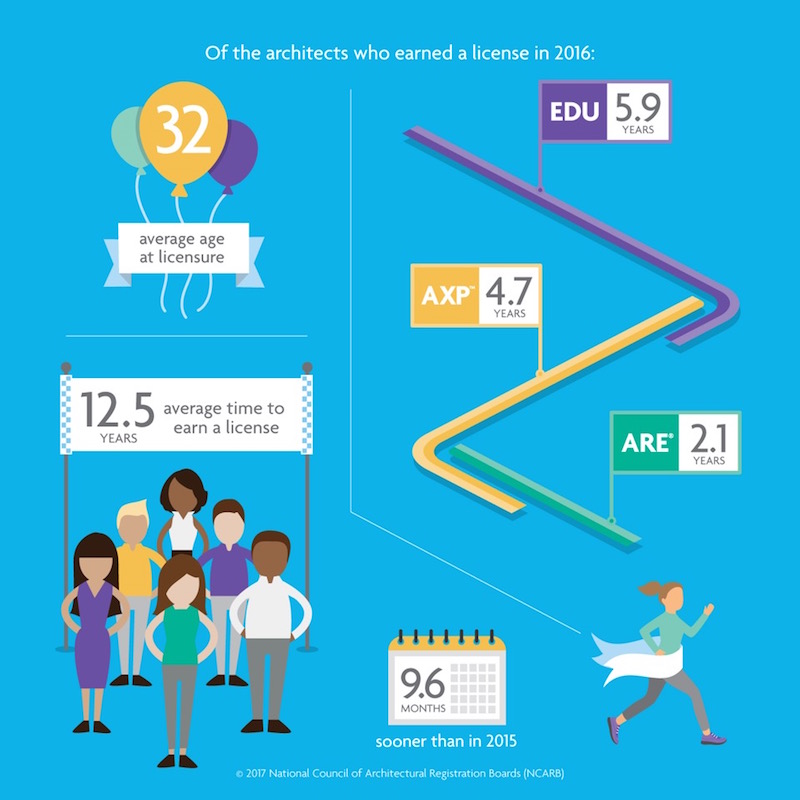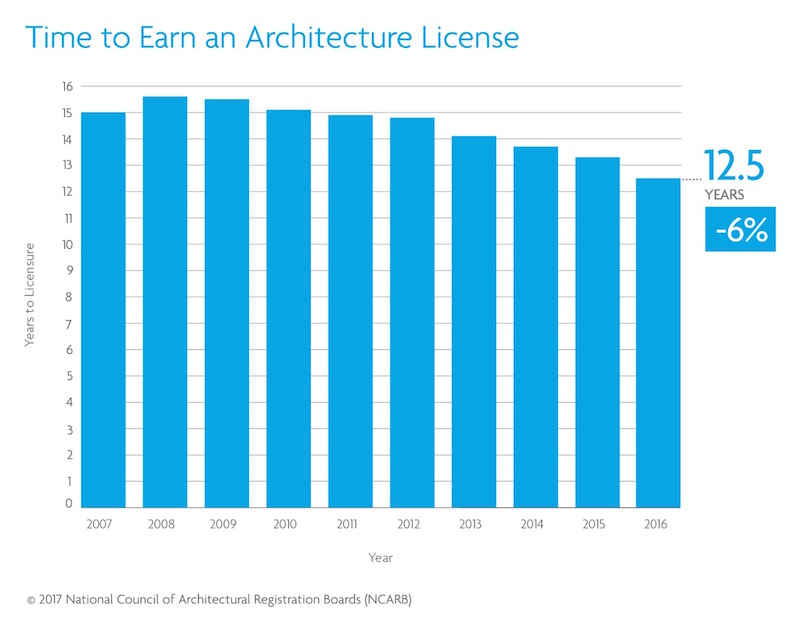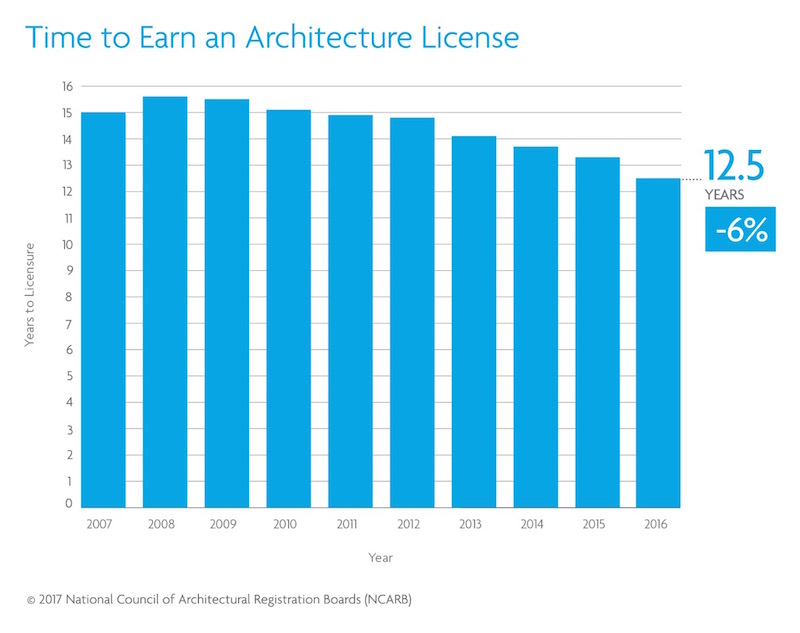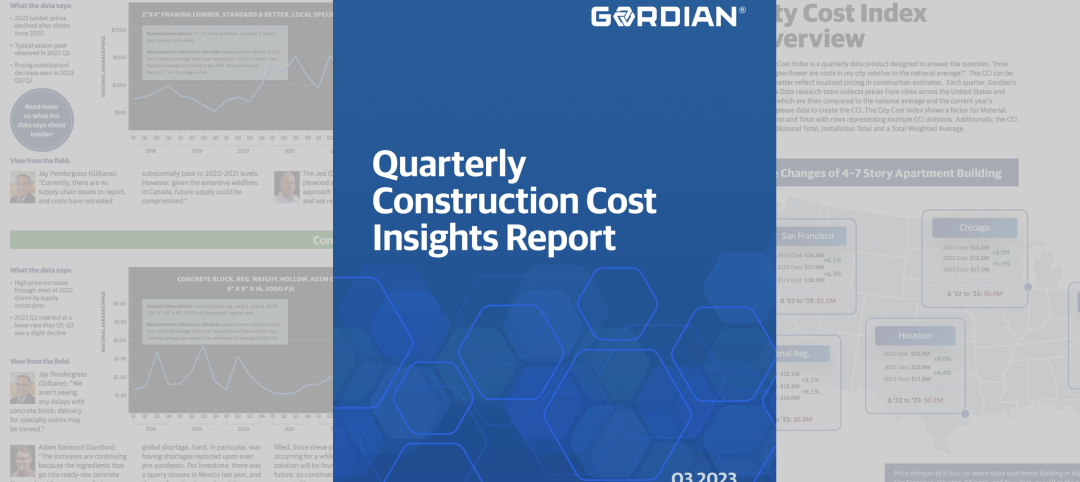The latest architect licensing data indicates that the time to become an architect has decreased to an average of 12.5 years—from the time a student enrolls in school to the moment they receive a license. This is the eighth year in a row that the timeline to licensure has shortened, according to data from the 2017 edition of NCARB by the Numbers. This trend is driven by candidates completing the experience and examination programs concurrently and more quickly.
Released annually by the National Council of Architectural Registration Boards (NCARB), NCARB by the Numbers provides exclusive insight into the number of U.S. architects, the pool of candidates working toward licensure, and diversity in the profession.
Over the past decade, NCARB has worked with licensing boards to streamline, update, and align two key pillars on the path to licensure: the Architectural Experience Program™ (AXP™) and Architect Registration Examination® (ARE®). These efficiencies have led to a reduction in completion times. Plus, newly licensed architects are increasingly overlapping these two programs. As a result, the time it takes to earn a license has gradually improved, with architects earning a license 9.6 months sooner than in 2015.

A closer look reveals that architects who earned an initial license in 2016 completed the AXP and ARE in just under six years. For comparison, architects licensed in 2015 took just under seven years to complete the two programs.
“By updating our programs to reflect the realities of modern practice, candidates can now pursue licensure in a way that ts their lifestyle,” said NCARB President Kristine Harding, NCARB, AIA. “With guidance from our licensing boards, NCARB has been able to open doors to a new pool of candidates while maintaining the rigor needed to protect the public’s safety.”
NCARB’s data also reveals that new architects are slightly younger. In 2016, the average age of a newly licensed architect was 32, an eight-month drop from the previous year. This marks the eighth year in a row that this benchmark has decreased, with architects earning a license 2.8 years sooner than a decade ago.

The full 2017 edition of NCARB by the Numbers will be available in July. To learn more about NCARB’s data, visit www.ncarb.org.
Related Stories
Urban Planning | Oct 12, 2023
Top 10 'future-ready' cities
With rising climate dilemmas, breakthroughs in technology, and aging infrastructure, the needs of our cities cannot be solved with a single silver bullet. This Point2 report compared the country's top cities over a variety of metrics.
Higher Education | Oct 10, 2023
Tracking the carbon footprint of higher education campuses in the era of online learning
With more effective use of their facilities, streamlining of administration, and thoughtful adoption of high-quality online learning, colleges and universities can raise enrollment by at least 30%, reducing their carbon footprint per student by 11% and lowering their cost per student by 15% with the same level of instruction and better student support.
Architects | Oct 4, 2023
Architects and contractors underestimate cyberattack risk
Design and construction industry firms underestimate their vulnerability to cyberattacks, according to a new report, Data Resilience in Design and Construction: How Digital Discipline Builds Stronger Firms by Dodge Construction Network and content security and management company Egnyte.
Building Materials | Oct 2, 2023
Purdue engineers develop intelligent architected materials
Purdue University civil engineers have developed innovative materials that can dissipate energy caused by various physical stresses without sustaining permanent damage.
Giants 400 | Sep 28, 2023
Top 100 University Building Construction Firms for 2023
Turner Construction, Whiting-Turner Contracting Co., STO Building Group, Suffolk Construction, and Skanska USA top BD+C's ranking of the nation's largest university sector contractors and construction management firms for 2023, as reported in Building Design+Construction's 2023 Giants 400 Report. Note: This ranking includes revenue for all university/college-related buildings except student residence halls, sports/recreation facilities, laboratories, S+T-related buildings, parking facilities, and performing arts centers (revenue for those buildings are reported in their respective Giants 400 ranking).
Construction Costs | Sep 28, 2023
U.S. construction market moves toward building material price stabilization
The newly released Quarterly Construction Cost Insights Report for Q3 2023 from Gordian reveals material costs remain high compared to prior years, but there is a move towards price stabilization for building and construction materials after years of significant fluctuations. In this report, top industry experts from Gordian, as well as from Gilbane, McCarthy Building Companies, and DPR Construction weigh in on the overall trends seen for construction material costs, and offer innovative solutions to navigate this terrain.
Multifamily Housing | Sep 26, 2023
Midwest metros see greatest rent increase in September 2023
While the median monthly price of rent has increased by 0.71% in August, the year-over-year estimates show a national change of -0.06 percent.
Data Centers | Sep 21, 2023
North American data center construction rises 25% to record high in first half of 2023, driven by growth of artificial intelligence
CBRE’s latest North American Data Center Trends Report found there is 2,287.6 megawatts (MW) of data center supply currently under construction in primary markets, reaching a new all-time high with more than 70% already preleased.
Data Centers | Sep 15, 2023
Power constraints are restricting data center market growth
There is record global demand for new data centers, but availability of power is hampering market growth. That’s one of the key findings from a new CBRE report: Global Data Center Trends 2023.
Contractors | Sep 12, 2023
The average U.S. contractor has 9.2 months worth of construction work in the pipeline, as of August 2023
Associated Builders and Contractors' Construction Backlog Indicator declined to 9.2 months in August, down 0.1 month, according to an ABC member survey conducted from Aug. 21 to Sept. 6. The reading is 0.5 months above the August 2022 level.

















